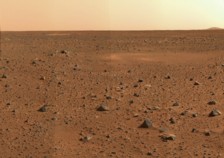
Above is the first ever picture of the surface of Mars taken by the NASA Viking 1 lander on July 20, 1976. I don't mind telling you that I'm really excited about all the space news we've been having lately, in particular of course the exciting NASA Spirit Rover exploration of Mars. I was 12 years old when Viking 1 landed on Mars in 1976. It was the most incredible thing to see the first images taken on the surface of another planet being beaming back into our homes. I still have a copy of National Geographic magazine from that time. Back then of course there's wasn't anything like the instant access to online libraries of pictures streamed to us via the Internet only minutes or hours after they were taken.
 Now my son is 12 years old and the Spirit rover is starting to make its way across the surface of Mars. Scores of images are available almost instantly. The Spirit rover image gallery is a daily must-visit web site for me though I detect, not least in my own family and sadly with my son, a certain impassivity towards all of this Mars news. Maybe it's all the Space Shuttle generation (oh no, not another Shuttle launch) or maybe it's just because people today are bombarded with images and events that just wash over them in a mass of information that many people just give up noticing. To think the rover is out there trundling away across the Mars is for me mind blowing. A tremendous achievement for science and engineering.
Now my son is 12 years old and the Spirit rover is starting to make its way across the surface of Mars. Scores of images are available almost instantly. The Spirit rover image gallery is a daily must-visit web site for me though I detect, not least in my own family and sadly with my son, a certain impassivity towards all of this Mars news. Maybe it's all the Space Shuttle generation (oh no, not another Shuttle launch) or maybe it's just because people today are bombarded with images and events that just wash over them in a mass of information that many people just give up noticing. To think the rover is out there trundling away across the Mars is for me mind blowing. A tremendous achievement for science and engineering.
Hot on the heels of NASA's success, and coincidentally just as the next US presidential elections get under way, George Bush has announced plans to send man back to the moon and ultimately on to Mars. Cynical electioneering aside this is great news and as many think, long overdue. Over the past two decades all of NASA's manned space programmes have been concerned with Shuttle missions which, while bringing us some way towards building a long-term space station (also long overdue), establishing countless satellites doubtlessly spawning the new era in mass communications and of course many unknown military missions, have done little to advance humankind's pioneering spirit and desire for exploration. Now we're getting back on track, though there are many hurdles to overcome before Bush junior's vision is realised (Bush senior's Mars mission got scrapped soon after it was announced).
Sending men and women to Mars won't be cheap. There are risks of course as two Space Shuttle disasters show but think how many lives were lost during the exploration of the world in the 15th & 16th centuries, or any of the other countless periods of exploration in human history. It's part of our nature to explore and the rewards are considerable. The rewards for sending a crew of humans to Mars are potentially incalculable. If live is discovered on Mars, even the most primitive life, it's be the single most important discovery in the history of human exploration. And even if life isn't found, discovering how Mars became the seemingly dry, desert-planet we see today could be essential for the future of this planet. But these are just a couple of the obvious big wins. There will be a great many other discoveries and breakthroughs along the way while developing a mission such as this, in science, engineering, communications, human physiology, not to mention international relations as a manned Mars mission will likely be a collaborative effort.
Gia's posted a long and thoughtful piece on the politics and economics of Bush's Mars plans. Should we pay for a Mars mission when there are people starving to death in the world? Gia says yes and I agree because I don't see it as an either/or choice. People are not starving anywhere in the world because the US is planning another space mission. We are not short of a cure for AIDS because the US spent hundreds of millions of dollars on the Spirit rover. And we don't have global warming because the US chose to go to the moon. Most of us in the developed world have a choice in how we live our lives and what we choose to do, collectively as nations and as individual citizens. We allow 3rd world starvation when we over consume and demand lower prices to fuel our excessive consumption. We allow massive corporations to divert investment into drugs that treat our illnesses brought on by our consumptive lifestyles rather than finding cures for illnesses that kill millions of people who are too poor to pay for their medicines therefore aren't paying customers. We allow global warming because of the wasteful way we choose to live. We have a choice. We can make this world a better place to live while at the same time exploring other worlds.